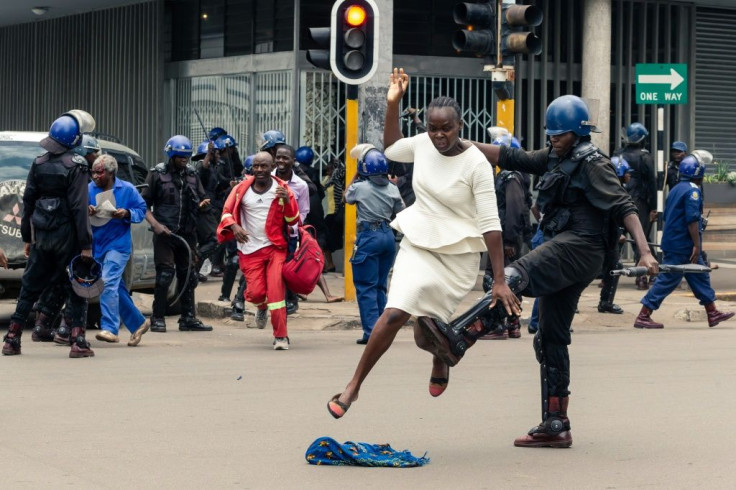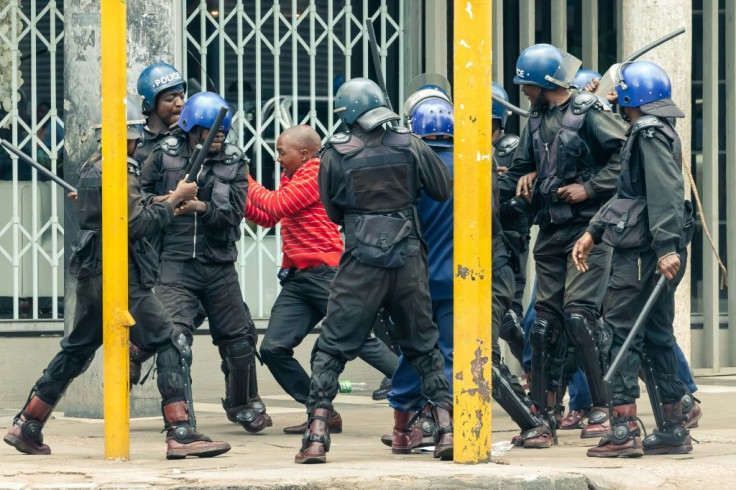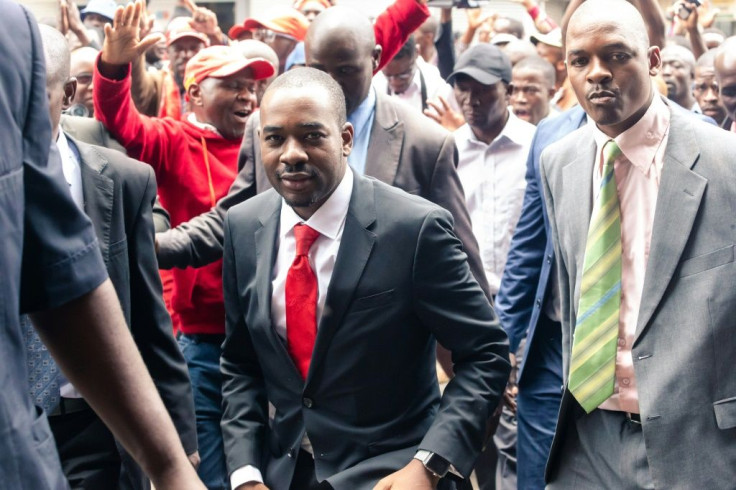Zimbabwean Police Beat Opposition Supporters After Rally Ban

Zimbabwean riot police fired tear gas and beat opposition supporters on Wednesday after barring a planned address by the main opposition leader, Nelson Chamisa, AFP journalists said.
Hundreds of supporters had gathered outside the Harare headquarters of the Movement for Democratic Change (MDC) after the party was denied permission to hold a rally in the city's Africa Unity Square.
Chamisa had been expected to make the address from the office balcony instead, but he later spoke to a few party members in a room inside the offices.
As the crowd danced to party songs blaring from speakers on the balcony, baton-wielding police surrounded them.
An AFP correspondent saw a man with a bleeding gash on his head and a swollen arm after being hit with a truncheon as he left a food outlet.
Several shops, eateries and banks pulled down their shutters.
"Many people were beaten up and injured," MDC spokesman Daniel Molokele told AFP. "We condemn the police brutality in the strongest terms."
The violence came as Zimbabweans grow more frustrated over their country's shattered economy and President Emmerson Mnangagwa's failure to deliver on promises of change two years after the ouster of long-time autocrat Robert Mugabe.
Critics say Mnangagwa's government has increasingly cracked down on dissent as protests have erupted this year over triple-digit inflation, power cuts and shortages of food and fuel.
"It's the same old regime. Worse than Smith," Molokele said referring to Ian Smith, the white-minority prime minister of the 1960s and 70s, who declared independence in defiance of Britain, the country's colonial power.

"Maybe they are afraid that what they did to Mugabe in November 2017 will repeat itself," said a man wearing a red MDC beret who identified himself as Terry T, referring to the military-led ouster of Mugabe two years ago.
Human rights lawyers said eight people, some of them bystanders, were arrested, including a mother with a 10-year-old baby strapped to her back.
"The 10 month-old baby is currently detained at Harare Central police station together with her mother, who was arbitrarily arrested by officers," said the Zimbabwe Lawyers for Human Rights group.
The United States, which has voiced doubts over how much Zimbabwe has changed since Mugabe, called on authorities to allow non-violent protests.
"We are concerned by the police's unprovoked use of force against peaceably assembled Zimbabweans today and call on the government of Zimbabwe to cease such violence against its own population," Tibor Nagy, the top US diplomat for Africa, wrote on Twitter.

Chamisa later addressed a few party members threatening unspecified action to force Mnangagwa to the negotiating table and predicting that the Zanu-PF leader's rule could end before Christmas.
"If you see the police behave the way they have been, it means the end is nigh. Christmas may not even come," Chamisa said.
"Brutality and repression is not sustainable, it cannot last forever," he declared.
"When you see a regime ...scared of its own people you know that the end is nigh, when you see a regime that uses forces against its own people you must know that legitimacy has evaporated."
"Mugabe is now looking like a small boy when it comes to dictatorship," Chamisa said.
On Wednesday prosecutors dropped treason charges against leading civil rights activist and priest Evan Mawarire, who was arrested in January for calling on Zimbabweans to miss work for a day in protest at the doubling of fuel prices.
Mawarire told AFP he was happy to be free but said it was "also disheartening" that the state was "willing to run with such futility and try to inflict the most pain as much as they can".
"They knew their case had no legs. It's a mockery of the judiciary," he said in a phone interview.
After his arrest Mawarire was incarcerated for 12 days at a maximum security prison outside Harare.
Zimbabwe is in the grips of an entrenched economic crisis, corruption and a crumbling health system.
The economy, crippled by decades of mismanagement under Mugabe, has failed to rebound under Mnangagwa, and many Zimbabweans say the situation has got worse.
Hyperinflation is wiping out savings; unemployment is estimated at around 90 percent; fuel, medicine and other essentials are in short supply; and doctors and some public-sector workers have stopped going to work as they cannot afford the cost of commuting.
© Copyright AFP 2024. All rights reserved.





















